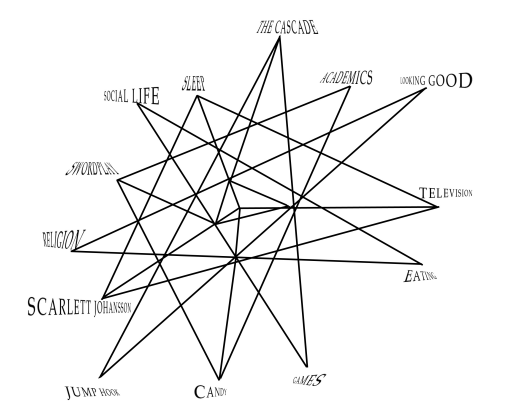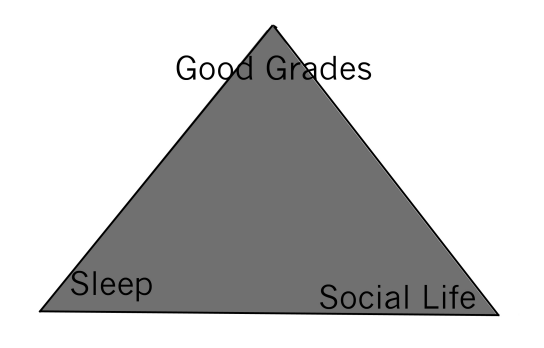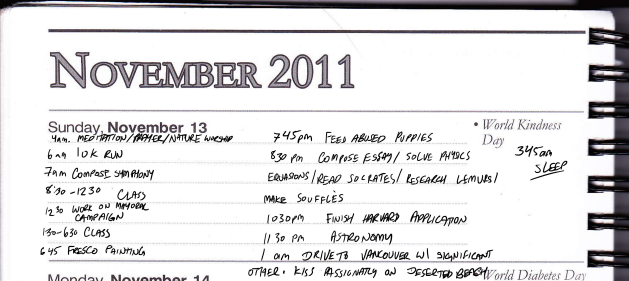Print Edition: November 16, 2011
It’s “that time of the semester” again, that legendary space between the exuberance of September and the euphoria of mid-December. It’s that time when you’re trying to balance two book reviews, an ethics presentation, and that dreaded second mid-term, knowing you have to clean your kitchen, work two shifts and then fly out to Minnesota for your sister’s wedding over the weekend. It’s “that time of the semester” as the professors call it, and (at least for me) the temptation to hide under the blankets and pray for a velociraptor apocalypse is growing by the hour.
I am (in my rare lucid moments) aware that I don’t actually desire the end of the world as I know it, and perhaps a few essay-writing marathons are preferable to becoming volociraptor chow. I could contact the Student Association for Psychological Counseling (SAPC), but I suspect they’d just explain to me the importance of stress analysis, time management, and positive thinking, and pretty soon I’d be entirely stress-free and have nothing to write or complain about. So instead I’m going to analyze a diagram my friend recommended, in the hope that it reveals some deep, fundamental truth about existence.
Diagram A
According to my friend this diagram represents the life of the student, and the three goals which the student attempts to keep in balance. Most sources agree that the average student can only accomplish two of the three goals at any one time, which I find a little disappointing. I mean, I don’t know about you, but if I only had three major goals (one of which I could literally accomplish asleep), things would be absolutely peachy. Either the average student has the intelligence of peanut butter or someone in the diagram-drawing guild has been grossly misinformed, because as far as I can figure my current goals look more like this:
Diagram B
I know that the shape in the first diagram is called a triangle, but I’m frankly unsure how to classify the second. It might be a polyhedron, an octogenarian or some form of modern art. There are aspects of life that just defy easy explanation.
Take the term “busy” for example. During “this time of the semester,” everyone is always complaining about how “busy” they are, how their lives have become a constant progression of essential responsibilities. Everybody has a list of upcoming assignments the length of a short novel. In fact, some student’s assignments include writing a short novel, as I’ve talked about in a previous article. Yet the fact is that we, as students, compare crammed schedules the way small children compare scars–with a little horror, a little pride, and a certain measure of mystified incomprehension. We can’t fully comprehend the frantic reality of our lives, partially because we suspect that to understand that reality would overwhelm our capacity to weather it.
Also (in my case and I suspect others as well), there is the small, terrifying suspicion that, based upon the testimony of the people sitting around me in class, everyone else is actually way busier than I am. This doesn’t change, no matter how many appointments I add to my schedule, or how many essays I have due in a given week. There is always that someone who’s taking five classes AND working full time AND applying for Master’s programs WHILE running a shelter for abused puppies. They smile bravely and act gracious about it, but their modesty is no match for my finely honed journalism skills, and so after a bit of digging I’m fairly confident their schedule looks like this:
Diagram C
Whereas my schedule, if analyzed that closely, would include large blocks of time dedicated to things that would not help me win the “busy” war, things like annoying my cat (4:30 p.m to 5:00 p.m.), YouTube Music Videos (9-9:30 a.m., 11:15-11:32 a.m., all day Saturday), and Donut Consumption (anytime, baby). I feel deeply inadequate about this, and I’ve even begun prefacing statements about my schedule with disclaimers like “I know I’m not as busy as most, but…” to openly acknowledge that I’m pretty much one massive, slacking, under-accomplishment compared to the people sitting beside me in class.
Of course, I do realize how perverse it is to both hate “that time of the semester” for its busyness and envy those who are busier than I. I also suspect that my classmates may not be as truthful as I when approximating how much time they spend on YouTube daily, and that people who sleep less than an hour a night are not capable of coherent sentences let alone frescoes. Yet I don’t think I’m alone in this conflict. In fact I think a large number of students (and other members of society) feel pressured to at least claim to be busy, if not to make themselves as busy as possible. Somehow we’ve established a direct connection between busyness and success, and therefore the most successful people are also the busiest and vice versa.
If this can be assumed, then it portrays something disturbing about us students and our culture in general. If we have truly embraced “success” as working 16 hour days and surviving on Tim Horton’s buttered bagels, then the deplored “that time of the semester” is actually a trial of our own self-worth. It may require the sacrifice of our bodies, our lives, even our very sanity, but it provides a profound affirmation as to our own importance in the general scheme of things. The guilty secret is that we like to “be busy,” because, after all, “busy” is only a synonym for words like “competent,” “efficient,” and “successful.”
To which I, of course, reply, “Release the velociraptors!”





